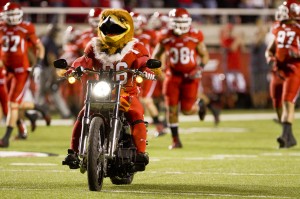The Holy War has entered a new era. Gone are the days of BYU and Utah meeting up for inense conference matchups as BYU is independent and Utah now belongs to the PAC-12
After this weekend’s matchup between the Cougars and the Utes, one of the most storied rivalries in all of college sports will take a three-year hiatus.
The so-called Holy War is one of the most irreverent tugs-of-war across the college football landscape. Yahoo Sports rates the rivalry no. 7 in the nation. But with conference realignments, perhaps Provo and Salt Lake City have never seemed so far apart.

Why is the BYU-Utah rivalry so bitter? Religion, proximity, history, state pride, offensive t-shirts and rude comments on cougarboard are all possible answers.
To Jessica Nguyen, a sophomore student at the University of Utah who described her family as anti-BYU, it’s simple.
“We just don’t like them,” she said.
The two teams have played each other every year since World War II. The sun has shone on each side of the rivalry at different stages throughout its history. From 1922 to 1941, the Utes went 20 games in a row against the Cougars without a loss (the teams tied three times during that period). BYU won 19 of 21 matchups between 1972 and 1992.
In 2013, the feud is in the middle of its most competitive era yet. Thirteen of the last 16 decisions between BYU and Utah have been decided by seven points or less.
Just as things were heating up, new conference alignments threatened to take the edge off the rivalry. Utah joined the prestigious PAC-12, and BYU became independent.
But rest assured, after two years of not being in the same conference, Ute fans still feel the same way about BYU.
“We still hate them,” said Dylan Vogel, a junior studying economics and film at the University of Utah. “It’s fun to hate someone. While perhaps [the rivalry] has changed, I don’t think it’s any weaker.”
Nguyen agreed.
“It’s good that we’re in the PAC-12,” she said. “But the BYU game is its own thing. It’s very important still.”
Utah students expressed their disappointment regarding the three-year break.

“Not playing each other for three years is a bummer,” said Kellen O’Maley, a junior studying strategic communications. “In my experience at the U, it’s been a fun game that has brought the school together.”
Elise Vandersteen, a freshman studying exercise and sports science thinks the absence of the annual rivalry game is unfortunate for both universities.
“I think the rivalry is good for both schools,” she said. “It’s a sad thing to see it go.”
Vogel echoed her sentiment.
“I’m disappointed,” he said. “I love the game and want them to play every year.”
The Utes have won seven of the last ten contests between the two schools, and on Sept. 21, they will contend for their fourth straight Holy War victory. Regardless of who comes out on top, one team will have bragging rights until 2016.




